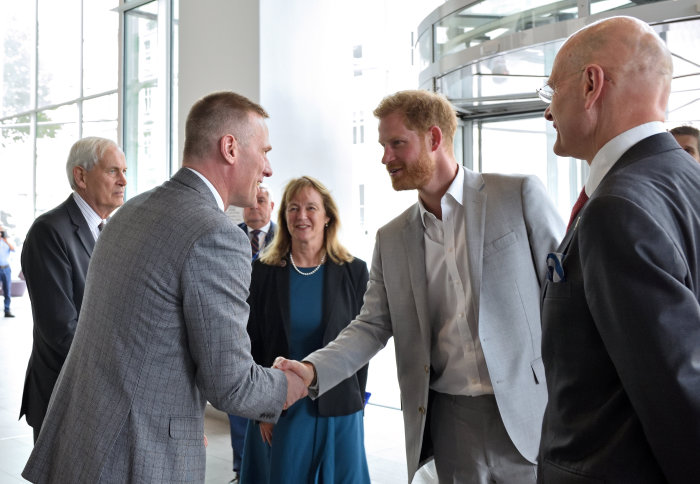Engineering, medicine, and science combine at the 2019 Blast Injury Conference

College leadership and The Lord Boyce welcome Prince Harry to the conference
Imperial’s Centre for Blast Injury Studies hosted engaging research, lively debate, and a Royal visit at the Blast Injury Conference 2019.
(The Conference was) a shining example of how bringing together scientists, engineers, medical professionals and military personnel for preventing and treating blast injuries can really change lives. Professor Anthony Bull Director of the Centre for Blast Injury Studies
The event at Imperial College London welcomed 220 delegates from ten countries, as well as His Royal Highness Prince Harry the Duke of Sussex, who visited as a friend of the Centre after officially opening it in 2013.
The Duke was greeted by Centre Director Professor Anthony Bull, Imperial President Professor Alice Gast, Provost Professor Ian Walmsley, and Admiral of the Fleet, The Lord Boyce.
Blast injuries are often associated with military personnel in war zones, but in today’s style of indiscriminate warfare they increasingly affect civilians and children by way of land mines, terrorist attacks, and abandoned unexploded devices.
Thanks to advances in both military and civilian medicine, more people are surviving blasts, but often with life-altering injuries.
That’s where the Centre – and its annual gathering of world-leading blast injury experts – comes in.

Professor Anthony Bull, Director of the Centre and Head of the Department of Bioengineering, said: “The Centre focuses on improving treatments and recovery through medicine, prosthetics and rehabilitation, and develops better ways of protecting those serving in current and future conflicts.
“The research discussed at this year’s Blast Injury Conference is a shining example of how bringing together scientists, engineers, medical professionals and military personnel for preventing and treating blast injuries can really change lives.”
The Centre, which is housed within Imperial's Department of Bioengineering, previously held networking and research events each November around Armistice Day, but these were upgraded to full conferences in November 2018.
The 2019 conference was the first international one of its kind, and the first to be held over two days instead of one. It touched on blast-related brain and musculoskeletal injuries, as well as the changing face of war and life beyond blast injuries.
The four Plenary speakers were:
- Professor Molly Stevens from Imperial's Departments of Materials and Bioengineeing
- Dr David Brody from the Uniformed Services University of the Health Sciences
- Dr Ghassan Abu-Sittah from the American University of Beirut Medical Centre
- Alistair Spearing, former British Army lieutenant
Funded by The Royal British Legion, the Centre addresses the disabling injuries of conflict with a clinically-led approach. The Centre enables civilian engineers and scientists to work alongside military medical personnel, all of whom are dedicated to investigating the research issues surrounding blast injury, to deliver change through new technology, equipment and policies.
The next International Blast Injury Conference will be held on 8th and 9th July 2021 at the Royal Institution, with a smaller, national meeting in 2020.
Article supporters
Article text (excluding photos or graphics) © Imperial College London.
Photos and graphics subject to third party copyright used with permission or © Imperial College London.
Reporter
Caroline Brogan
Communications Division








